#Baha'i religion
Text

_fotoalpaso_
Baha’i Temple in Santiago
Located on the foothills of the Andes, in Chile, the temple was opened in 2016 and it belongs to the Baha’i Faith. 1,129 unique pieces of both flat and curved cast-glass pieces were produced and assembled to create each of the nine torqued wings. The temple is a domed and luminous structure, reflecting the topography of the Andes and it is surrounded by reflective pools. Since Baha’i Faith is built upon the tenet of universality, the temple aims to welcome people of all cultures and faiths. It is the last of the eight continental temples built by the Baha’i Community.

fio_arquitetura
#_fotoalpaso_#photographer#baha'i temple#temple#santiago#chile#andes#architecture#religion#baha'i community#fio_arquitetura
7 notes
·
View notes
Text
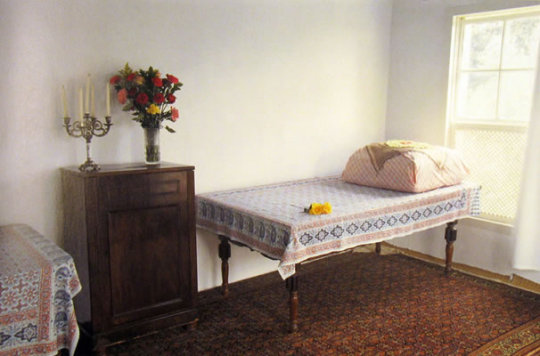
The room of Bahá’u’lláh at the Ridván Garden as it looks today.
During one period, Bahá’u’lláh stayed at the Ridván Garden for nine days, meeting with the pilgrim groups that came out each day from ‘Akká to see Him.
In 1881, the Ridván Garden was purchased for Bahá’u’lláh. Pilgrims still go to the little house there for prayer and meditation.
(Photograph: Baha'i International Community)
42 notes
·
View notes
Text
The Baha'i faith teaches unity of all the world's religions

Founded in 19th Century Iran, the Baha'i faith built off of the previous three Abrahamic religions. The Baha'i believe that all of the world's major religions have been revealed by the same God.
From Wikipedia's article on the Baha'i faith:
According to Baháʼí teachings, religion is revealed in an orderly and progressive way by a single God through Manifestations of God, who are the founders of major world religions throughout human history; Buddha, Jesus, and Muhammad are cited as the most recent of these Manifestations of God before the Báb and Baháʼu'lláh.
Despite their religion's inclusive and progressive nature, the Baha'i people have faced ongoing persecution, particularly in their home nation under the Islamic Republic of Iran. But despite attempts to suppress it, the Baha'i faith is one of the fastest growing religions in the world, as well as one of the most widespread around the globe.
The Baha'i people have an elected leadership for their entire religion, comparable to the Vatican for Catholicism. It's called the Universal House of Justice, and is located in Haifa, Israel; also in Haifa are the Shrine of the Báb, and its famous gardens, also known as the Hanging Gardens of Haifa.


The main symbol of the Baha'i faith is the nine-point star. Others include the five-point star, the Greatest Name, and the Ringstone Symbol. (Link)






#baha'i#baha'u'llah#Shrine of the Báb#hanging gardens of haifa#symbols#the greatest name#nine point star#the ringstone symbol#religon#temple#minority religions#iran#israel#haifa#gardens#islamic republic of iran#sharia law#world religions#islam#muslim#christianity#christian#jewish#judaism#buddhism#buddha#jesus#muhammad#jewblr#jumblr
4 notes
·
View notes
Text
Abrahamic Faiths
Because I thought there were only three but it turns out there are more.
Abrahamic faiths are religions that worship the God of Abraham.
Judaism: Characterized by belief in the God who revealed himself to Abraham, Moses, and other prophets, and by living in covenant with God according to scripture and tradition
Christianity: Characterized by the belief that Jesus of Nazareth is the Messiah and the Incarnation of God
Islam: Characterized by following the teachings of Muhammad, who is viewed as the last prophet sent by God
Baháʼí Faith: Characterized by the belief that Manifestations of God have founded various world religions throughout history, with the most recent being the religion's founder, Baháʼu'lláh.
Druzism: Characterized by following the teachings of Hamza ibn ‘Alī ibn Aḥmad and by belief in reincarnation.
Gnosticism: Characterized by the belief that the world was created and governed by a lesser deity, while Jesus was a messenger of the supreme deity and enabled human redemption.
Mandaeism: Characterized by a lack of set doctrines and creeds and by revering John the Baptist as a major prophet.
Rastafari: Characterized by the belief that God partially resides in every person and by the reverence toward the Ethopian emperor Haile Selassie.
Samaritanism: Characterized by the belief that the Samaritan Pentateuch is the only true, unchanged version of the Torah.
#religion#religions#Abrahamic faiths#Abrahamic religions#faith#Judaism#Christianity#Islam#Baha'i faith#Druzism#Gnosticism#Mandaeism#Rastafari#Samaritanism
23 notes
·
View notes
Text
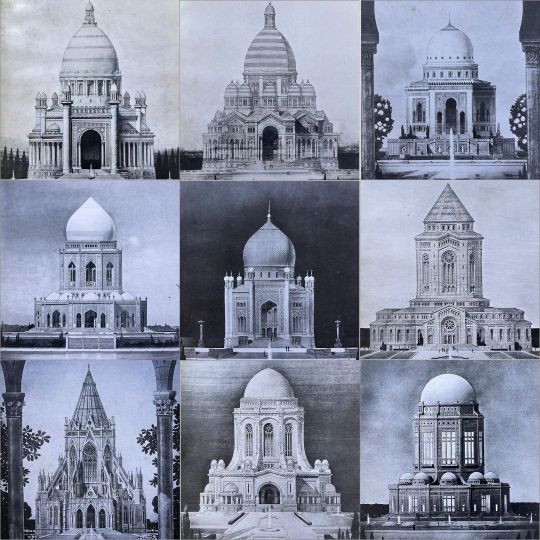
While working through our backlog of architectural books, we stumbled upon this intriguing piece of the history of the Baha’i Faith. The Baha’i Faith religion, originating in Iran in the nineteenth century, teaches the unified purpose of the major world religions. This 1917 publication details plans to construct the first Mashriqu'l-Adhkár (Baha’i house of worship) in the United States of America.

Bookplate of Charles Mason Remey
Charles Mason Remey (1874-1974) was an American architect who grew up in the Midwest and trained at Cornell and the École des Beaux-Arts. While studying in Paris, he learned about the Baha'i Faith from May Maxwell and became an adherent of the faith in 1899.
When Charles Mason Remey was making plans to construct the first American Baha’i temple, he didn’t have much in the way of precedent to guide him. At the time of publication in 1917, the first and only other temple in Ashgabat, Turkmenistan, was still two years away from completion. The Baha’i faithful had already settled on the location of the American temple in Wilmette, Illinois; in 1912, ʻAbdu'l-Bahá himself laid the cornerstone.
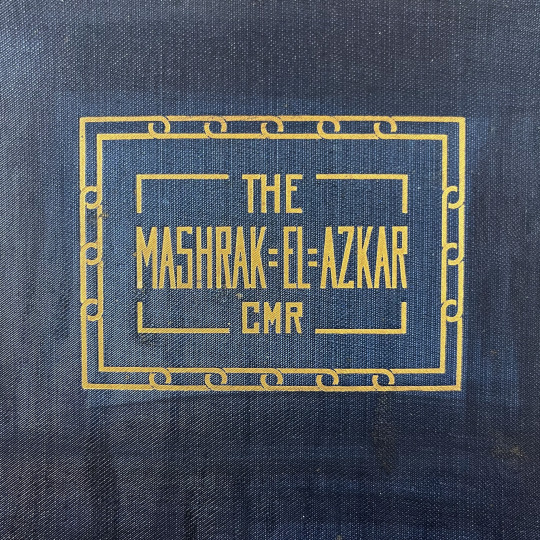
Front cover design
Remey put forth a variety of design styles for the house of worship, but one element–the repetition of the number nine–remained consistent. Why the number nine? In the Abjad numerical system in which Arabic letters correspond to numeric values, the letters in the word “baha” add up to nine. The founder of the Baha’i Faith, Ḥusayn-ʻAlí, took on the Arabic title “Baha” which translates to “glory” in English. Therefore, the number nine holds a sacred significance for members of the Baha’i Faith.
Charles Mason Remey even went so far as to propose nine different architectural styles for the American temple: Classical Roman, Byzantine, Arabian, Persian, Indian, Romanesque, Gothic, Renaissance, and Modern.
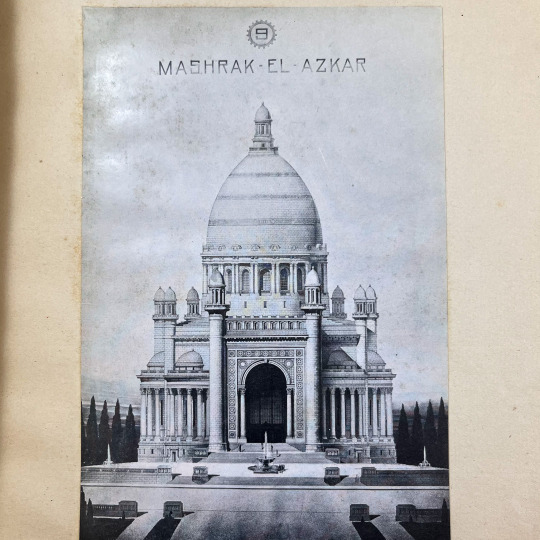
Style: Classical Roman
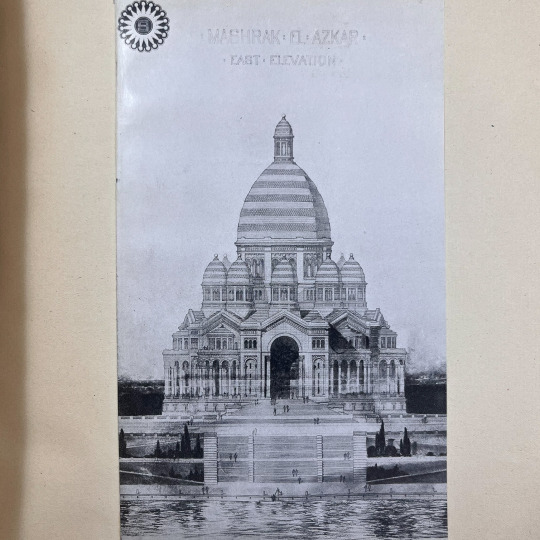
Style: Byzantine

Style: Arabian
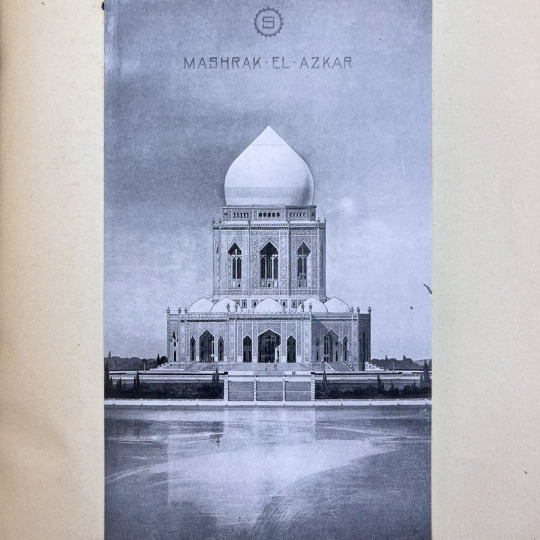
Style: Persian

Style: Indian
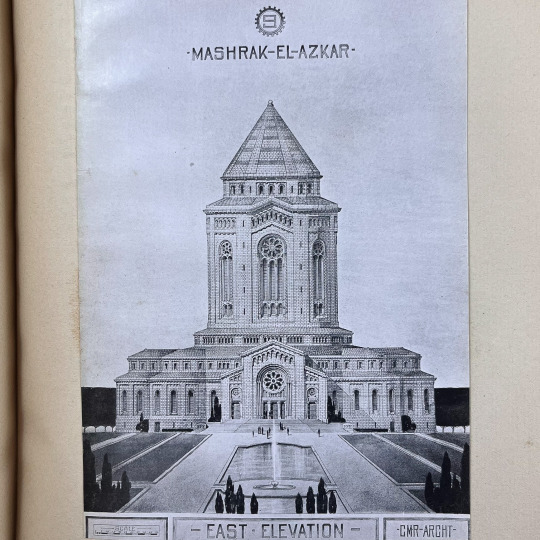
Style: Romanesque

Style: Gothic
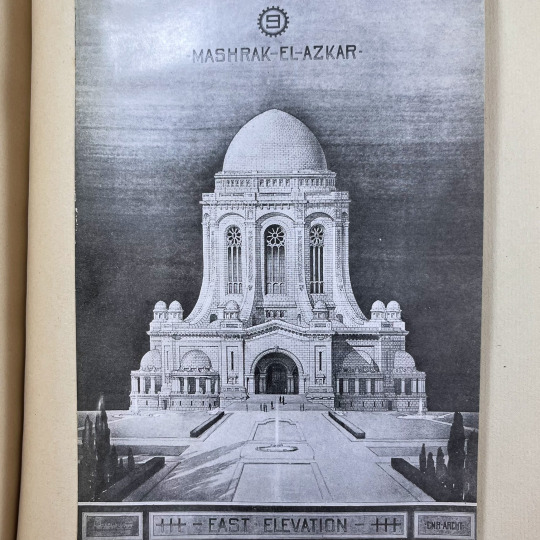
Style: Renaissance
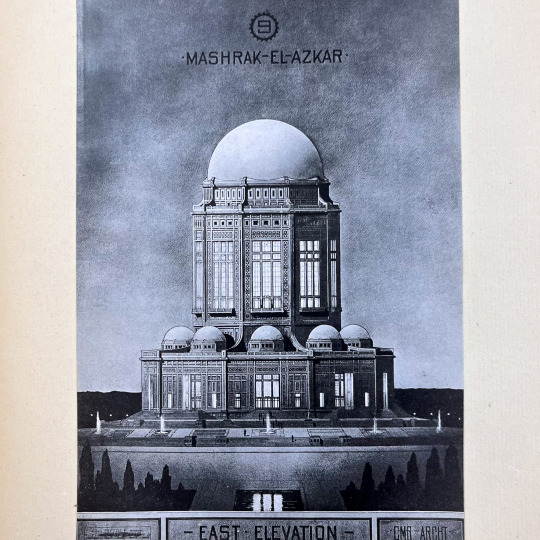
Style: Modern
In the end, Baha’i leaders went with the design of French-Canadian architect Louis Bourgeois; the Wilmette, IL, Mashriqu'l-Adhkár was completed in 1953 and still stands today. Remey did go on to build Baha’i temples in Kampala, Uganda, and Sydney, Australia, as well as the Baha’i International Archives building in Haifa, Israel. In 1960, after proclaiming himself the Guardian or the head of the Baha’i governing body, Remey was excommunicated and led a splinter group of followers for the remainder of his life.
Images from:
Remey, Charles Mason. Mashrak-el-Azkar: Descriptive of the Bahai Temple and Illustrative of an Exhibition of Preliminary Designs for the first Mashrak-el-Azkar to be built in America. Chicago: Bahai Publishing Society, 1917. Catalog record: http://bit.ly/3BfICj9
50 notes
·
View notes
Text
sometimes you realize that, as a child, you were given bigoted propaganda against the religion you were raised in by a teacher and you don't think anything of it until you're an adult
#i imagine the book was full of negative information about all kinds of non-christian religions#i just looked at the baha'i stuff i was shown and was like#"oh no#“this isn't right what a weird mistake to make”#and didn't even think there was anything wrong with it until like. today#people are wild towards children huh
5 notes
·
View notes
Quote
Suffering is both a reminder and a guide. It stimulates us better to adapt ourselves to our environmental conditions, and thus leads the way to self-improvement. In every suffering one can find a meaning and a wisdom. But it is not always easy to find the secret of that wisdom. It is sometimes only when all our suffering has passed that we become aware of its usefulness.
Shoghi Effendi
27 notes
·
View notes
Text
My best friend in the world recently started dating a new girl, and she's sooooo pretty!
She's Iranian and a recent immigrant to Canada, so I've already heard stuff that makes her sound like the coolest. Like how she never got to learn to cook at home, because her mother *always* cooked, so after coming to Canada all on her own she's had to not only learn to cook from scratch, but has learned to cook her cultural dishes all on her own and away from the ingredients she's used to.
She sounds like the coolest girl in the world and I'm wondering about if it's socially alright to want to be friends with your friend's GF lmao. Not because of ulterior motives, I have my partner I love, I'm just terrible at making friends and have no idea how to breach that lol
#My best friend in elementary school was also an Iranian girl that was insanely pretty#She was baha'i#A religion I probably never would have heard of if it weren't for her!#Her house always smelled like spices in the best way possible#We lost contact around high school when she moved
0 notes
Text
Does anyone else who fasts religiously notice that some years are hungry ones and others are just plain thirsty?
Also, pour one out for those poor suckers who walk away from a water fountain and freeze like Wily Coyote over a trap door when they realize what they've done, because they sure as hell can't pour one out for themselves.
#Bahai#baha'i faith#Islam#Ramadan#Fasting#Fasts#There's other religions that fast#But I don't know how many others#Do dawn until dusk
1 note
·
View note
Text
see the light ?
#Baha'i#Buddhism#Christianity#Confucianism#Hinduism#Islam#Jainism#Judaism#Shinto#Sikhism#Taoism#Zoroastrianism.#religion#atheist#cult#the cult of the first light
0 notes
Text
Pete Haug discusses how religions and denominational distinctions divide us and how Baha'is show a different path.
0 notes
Text




khan al-umdan (caravanserai of the columns) in acre is one of palestine's best-preserved caravanserai, a type of inn historically common across asia, north africa, the caucuses, and southern europe, especially for travelers along trade routes like the silk road. it was built in 1785 on the order of ottoman governer ahmed pasha al-jazaar (who also has a mosque named for him nearby). the clock tower was added in 1906 to celebrate the silver jubilee of sultan abdul hamid II.
khan al-umdan served as more than just an inn - due to its proximity to acre's port, it also served as a spot for merchants to store and sell wares. it also gained importance to the baha'i faith, as it served as a site where baha'ulla (founder of the religion, he was imprisoned in acre later in life) received guests, and held a baha'i school. many palestinians found refuge inside the khan during the nakba, but were later forcibly expelled and evicted up to the 1980s.
it continues to be used for events today, but not as often as it used to be. despite being a popular tourist attraction and designated as a world heritage site, the caravanserai has also been facing further neglect due to gentrification and has also been in danger of being dispossesed for quite some time now.
#palestine#architecture#my posts#the word ''khan'' in arabic and hebrew has the same origin as ''caravanserai''#no relation to mongolic/turkic ''khan'' (king) (which has no relation to english ''king''/german ''kaiser''/etc)#also the world center for baha'i is in acre too.. they get a lot of shit across the me unfortunately especially iran where it originated#palestine also has a pretty substantial ahmadiyya population for a middle eastern country. the leader managed to convert quite a few#families in the 1920s while visiting#and ofc there's the druze which is a whole other thing
16 notes
·
View notes
Text
i've seen a lot of people push back against din's sect of mandalorians being called a cult, and to some extent, i understand that. closed cultural and religious practices are often degraded in fandom and just in general online and therefore there is a natural instinct for a lot of us to want to defend them even when fictional. but i think we have to be aware while doing so of seeing the differences between the practices that people choose and participate in out of love and respect for a religion/culture that shows them care in return and the practices that people are indoctrinated and then shamed into continuing even when they are harmful. and how often the two intersect.
a mandalorian not being able to remove their helmut even when it could be harmful to their health, even deadly as we've seen throughout the show is concerning. as is them not being able to remove them in situations that affect the wellbeing of others, i.e. when din needed to have his face scanned to be able to save grogu. this is especially true since doing so results in being forced out of the religion and therefore the community and even ones family without any thought for the extenuating circumstances or the effect being cut off will have.
and this is where it differs from other religions. lots of religions have rules and systems that are followed, well religiously. but they also have exceptions to take into account the human aspect.
in Islam, fasting is not expected to be practiced by anyone who would have any sort of negatively affected health by doing so. the same is true within Judaism and many of other religions.
in Baha'i drugs and alcohol are prohibited unless they are prescribed by a doctor.
in Judaism, Pikuach Nefesh means that saving a person's life comes before all else. this means that Shabbat's rules can be broken to save a life. including one's own.
alternatively, we've seen the real life affect of religions putting rules over human life. right now, this is at its most obvious with the christian right and their treatment of abortion, even when not having one could kill the person carrying a child.
the threat of alienation and abandonment by your community if you break their rules even to do what is right (and protecting and taking care of your health is what is right) is coercive and abusive no matter the culture or religion.
bringing young children into this before they are old enough to truly consent to and understand what they are getting into is just wrong. and when a child is adopted into a religion and culture following the loss of all they know and love like din was, that is especially true.
so no, the watch may not be a cult per say, but it is definitely not just any other religion deserving of respect and defense. and din deserves better.
#yes i did grow up in an abusive christian school#why do you ask?#the mandalorian#star wars#din djarin#death watch#the armorer#paz viszla#religion#religious abuse
104 notes
·
View notes
Note
I cannot help but feel Jewish people have a right to a state in the region after what the Romans under Tiberius and others did, but it should not require atrocities against other people's in the area. Being bullied does not justify bullying others, no matter how many generations suffered. Is there really no way the children of Ishmael and Isaac can live peacefully in Abraham's land? Are any of them even willing to try?😥
I don't oppose Jewish people having their own state, it's literally none of my business how they organize or not, but they don't get to destroy and brutalize an existing population to achieve it just because the British agreed.
Exactly like you've said it, it should not require atrocities against other people but that's what Zionism requires, because it claims sovereignty over a land important to Christians, Muslims and Jews alike. To make Palestine a Jewish ethnostate, it requires erasing the footprint of other religions.
While some prospects of Zionism have merit — calling for protection to a historically persecuted group and understands that the creation of a State is the safest and most efficient way to do so —, all rhetorics used to create Israel, as we know, are untrue and baseless.
Some say that Israel must exist because the Jewish are the only ethnic group without it's own state, which is just widely untrue. Many other persecuted groups like the Mbuti, Romani and Karen people are not even acknowledged and do not have their own State. Even if you consider just religious groups, there are thousands of religions that do not get their own state for there's no reasonable way to empty an entire land nor force people to convert to their beliefs. The Baha'i face ongoing persecution to this day and do not have their own State, for example.
Finally, to say Palestine belongs to the Jews because of the Holy Book it's specially insane, since we shouldn't force our religious beliefs onto others, but also because it's widely untrue.
The first explicit promise to Abraham was at Sichem described in Genesis, Chapter 12 and verse 7: "Unto thy seed will I give this land." The words in Chapter 15, verse 18, are clearer: "Unto thy seed have I given this land, from the river of Egypt unto the great river, the river Euphrates." The words used are "to thy seed" which would include all who descended from Abraham.
All Christians, Jews and Muslims believe that Ishmael was the firstborn of Abraham and is recognized by Muslims as the ancestor of several northern prominent Arab tribes and the forefather of Adnan, the ancestor of Muhammad. Muhammad was the descendant of Ishmael who descended from Abraham, whose descendants were promised Palestine/Canaan.
The words of Genesis 21, verses 13, concludes: "And also of the son of the bondwoman will I make a nation, because he is thy seed." Therefore, despite Israelites calling themselves the 'seed of Abraham', the descendents of Ishmael have every right to call themselves his seed also and ultimately to live in the land.
Furthermore, at the covenant of circumcision made with Abraham (Genesis, Chapter 17), when Canaan was promised to him, it was Ishmael who went through it: Isaac had been born yet.
Therefore the Divine promise included all descendents of Ishmael and although narrowed down in the times of Isaac and Jacob, it did not exclude their Arab brethren. It is well known that many Arabs accompanied Joshua into Palestine.
If everything Israel is based on it's false or unfairly violent, can anyone really claim it has the right to exist?
I'm sorry for the gigantic text but I came back to thousands of asks about if I think Israel deserves to exist and some pointed out the religious rhetoric to justify Israel, I've picked yours to unleash this for no exact reason other than you sounded the most empathetic and I'm trying to stop only answering the nasty asks.
And again, I'm sorry, I don't wish to sound aggressive or impolite but can we stop implying Palestinians are not willing to try? We have no power over Israel, any attempt at peace and justice must come from them first. We can only counter react to Israel, we have no upper hand over them.
21 notes
·
View notes
Text
Racism of the Islamic Republic regime
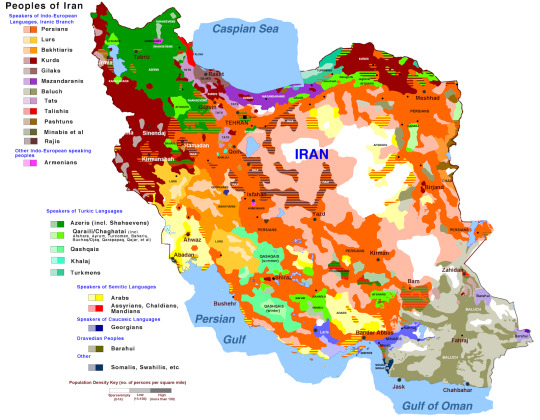
Something that has been neglected in topics of protests in Iran is racism. It is often left out of discussions by those of us in or outside of Iran who weren't the direct victims of these antihuman crimes. There's a huge difference between human rights violations in central Persian cities and border non-Persian ones. Persians and other ethnic groups who live in central areas are the targets of enough antihuman acts by this regime that shows the terrorist face of them, just imagine how everything is ×100 worse in non-central areas. Here are some examples:
Arabs in the south: it is estimated that more than 2 million Arabs live in iran. This ethnic minority is severely oppressed and violated. The regime has been capturing and executing Arabs and Arab activists with no clear reason other than being criminal dictators themselves, like how they've been violating and killing Kurds and Balochs in the past 4 decades. Many Arab families have been forcefully moved and pushed to corners, literally in a geographic sense. Racism exist in the Iranian populations like any other country and nation in the world. But it is promoted and supported by the regime. Jina revolution has brought this issue to attention and social activists are doing anti racist activism now, something that wasn't addressed enough before.
Kurds in the west: people of Kurd never accepted the authority of this regime and fought their forces with all their might. Many Kurds citizens and Kurd activists have been the victims of government murder or long imprisonments simply for being freedom fighters. Also, kurds are denied many legal and social rights in Iran, for example not getting hired by governmental organizations, unless they sell their souls to the regime. Because of this many highly educated Kurds can't find a job and they're forced into doing unrelated or illegal labor that often gets them killed. To understand the severity of this issue I recommend you read this article "koolbars new slaves" thoroughly.
Balochs in the east: people of Baloch are victims of the IR regime's racism towards our neighbors, Afghans and Pakistanis. The regime refuses to provide ID papers for Balochs with the excuse that they might be Afghan and not Iranian. The Balochistan province is kept extremely underdeveloped by the regime to the point that many people don't have drinking water there. Kurd and Arab cities are also kept underdeveloped even though most of those areas are rich with natural resources that could easily be used for development. Since many Baloch people are denied id papers they have no legal rights and the regime often gets away with whatever human rights violations, like executions, r*pe, and torture, they do there. Other than the issue of legal rights, the islamic republic had been very successful in isolating Balochistan and keeping the rest of the world including the rest of Iran of knowing who Balochs are and what is really going on in that region. Jina revolution has also brought the issues in Balochistan to attention.
Aside from these intentional neglects, the language and culture of these ethnicities are under attack by the regime.
Other ethnic groups in Iran face discrimination to different degrees by IR. One thing that plays a great role in the level of racism by the regime is religion. Sunni Muslims are very hated and suppressed by the Islamic Republic here. Therefore kurd cities with a majority of Sunni Muslim population face a worse fate than the majority of shia cities. The regime also spreads a lot of hate towards sunni Muslims by accusing them of fanaticism and animosity which used to work on the old shia religious population. Kurds, Balochs, Arab and Turkmens in Iran have the majority sunni Muslim population. They are also the most repressed. Apart from sunni Muslims, Jewish, Zoroastrian, Baha'i and christian believers face discrimination in different ways by the regime.
The only way a war against big criminal bullies like the Islamic Republic can be won is by coming together and unite as people regardless of race, religion, sexuality and gender. Something that seemed not possible 2 years ago but Jîna revolution showed us that it is very much a possibility. We still have a lot of work to do but people took the first step in unity and solidarity. I recommend you read the article below twice to see the dept of what's going on in Iran and why the Islamic Republic overthrow and this revolution is vital to many marginalized people:
#iran#iran protests#iran revolution#human rights#politics#feminism#middle east#mahsa amini#jina amini#women life freedom#jin jiyan azadi#kurds#kurdish#baluchi#arabic#racism#police brutality#irgcterrorists#intersectional feminism#background information
126 notes
·
View notes
Text
So.
I keep thinking about my death and making a will, and what will happen when I die.
Even less important things, like my fanfics. I spent too long thinking about a system that if anything happened to me, my readers would get the scripts/ at least an announcement that this won't be updated.
(yes, I know it's a bit silly. But it's what my mind goes to.)
Anyway!
So, between the massacre, several murders around the world, terror attack, and 'just' regular antisemitism AKA blood libels, bullying and slurs-
Have you thought about your mortality recently?
(To be clear: this poll is to be answered by a) Jews, including in the diaspora, or b)Israelis or ppl currently stay in Israel, regardless of their ethnicity or religion, include muslims, Christians, Druze, Baha'i, etc.)
Death preparations - anything from writing a will, to getting a organ donor card, to buying a place in graveyard, getting insurance, have conversation with the family, etc.
Also feel free to share what did you do, or why, or in what circumstances.
Like, I think I have a will. But I always tell myself I need to get it official. I wanted to, but I'm constantly aching and tired so it didn't happen.
Also the CONSTANT thought about my fanfic, qnd what will happen to all my work if I die (/kidnapped/wounded hard).
#jumblr#actually jewish#jewish culture#morbid question#death#mortality#thoughts#07/10/23#massacre#israel massacre#thoughta about death#ישראבלר
14 notes
·
View notes